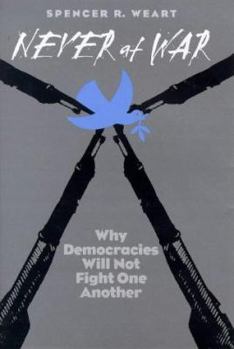Never at War: Why Democracies Will Not Fight One Another
Select Format
Select Condition 
Book Overview
This survey of the history of conflict between democracies reveals an important finding: fully democratic nations have never made war on other democracies. Furthermore, historian Spencer R. Weart... This description may be from another edition of this product.
Format:Hardcover
Language:English
ISBN:0300070179
ISBN13:9780300070170
Release Date:September 1998
Publisher:Yale University Press
Length:424 Pages
Weight:1.75 lbs.
Dimensions:1.2" x 6.5" x 9.5"
Customer Reviews
1 rating
Thoughtful: 4.5 stars
Published by Thriftbooks.com User , 17 years ago
This is a well written and thoughtful analysis of the "democratic peace theory" argument. A number of political scientists have argued that one of the few empirically established truths of international relations is that democracies do not war on each other. This idea was actually suggested by the philosopher Kant approximately 2 centuries ago, a prediction that has turned out to be somewhat surprisingly correct. Weart opens by reviewing the political science literature on the democratic peace theory, concluding that it is valid. Most of the book is devoted to exploring why this phenomenon exists. Weart's conclusion is that the domestic political culture of a nation's leadership is responsible for its approach to international relations. Republican states, especially established democracies, have cultures of compromise, accomodation, and respect for dissenting views. These cultural traits carry over into international affairs. Conversely, authoritarian states, whose leadership usually arises in an atmosphere of ruthless competition and repression, will tend towards more aggressive and inflexible modes of international conduct. This brief summary doesn't do justice to Weart's systematic presentation of his argument, which is based on an unusually thorough review of the historical and relevant political science literature. Weart points to some unexpected and predictable consequences of his formulation. For example, in addition to finding that democracies don't war with each other, he finds as well that oligarchic republics, which have some of the same political culture as democracies also have a low rate of mutual warfare. Also, democracies and oligarchic republics also have a tendency to form unusually successful/stable alliances, in contrast to authoritarian states. Weart is careful to specify that he is not arguing that democracies are intrinsically peaceful, pointing in particular to a number of examples from American history. Weart's last chapter, which is on spreading democracy, turns out to be quite topical. Given the advantages of peace to democratic states, he discusses ways in which democracy can be spread. He makes a good argument that direct military intervention is usually a relatively poor way of spreading democracy. Weart's book was published in 1999, well before the current Iraq mess. My only criticism is that I wish Weart had presented some of his data in tabular or numerical form.




